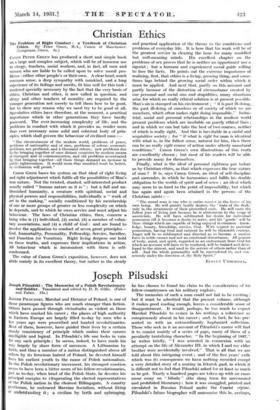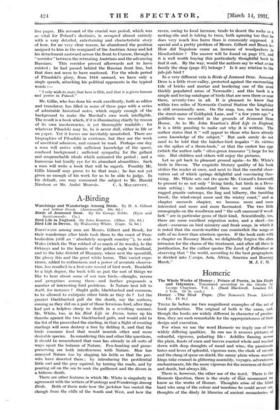Joseph Pilsudski
JOSEPH PILSUDSHI, Marshal and Dictator of Poland, is one of those picaresque figures who are much stranger than fiction. Others have passed through vicissitudes as violent as those which have marked his career ; the places of high authority in Eastern Europe are largely filled to-day by men who a few years ago were proscribed and hunted revolutionaries. Most of them, however, have guided their lives by a certain steady consistency of principle which makes their careers intelligible and logical. In Pilsudski's life one looks in vain for any such principle ; he seems, indeed, to have made his way largely by sheer force of unreason. A Lithuanian by birth, and thus a member of a nation distinguished above all others by its ferocious hatred of Poland, he devoted himself from his earliest youth to the cause of Polish nationalism. In the Polish revolutionary movement, his strongest emotion seems to have been a bitter scorn of his fellow-revolutionaries, Just as to-day, when head of the Polish State, he devotes his principal energies to vituperating the elected representatives of the Polish:nation _in the choicest Billingsgate. A country gentleman, he embraced Marxian Socialism, without liking Or understanding it ; a civilian by. birth and upbringing, he has chosen to found his claim to the consideration of his fellow-countrymen on his military exploits.
The memories of such a man could not fail to be exciting ; but it must be admitted that the present volume, although it makes good reading enough, leaves a considerable sense of disappointment. It would, perhaps, be too much to expect Marshal Pilsudski to evince in his writings a coherence so conspicuously absent in his career ; and, in fact, he has pre- sented us with an extraordinarily haphazard collection. Those who seek in it an account of Pilsudski's career will find it to consist mainly of a series of gaps, many of them of a peculiarly tantalizing character. " In the beginning of 1887," he writes briefly, " I was arrested in connexion with an attempt on the life of Alexander III. in which I and my elder brother were accidentally involved." That is all that we are told about this intriguing event ; and of the five years' exile which was its consequence we have nothing recorded except a very detailed story of a mutiny in Irkutsk gaol, in which it is difficult not to feel that Pilsudski asked for at least as much as he got. Nearly a hundred pages are taken up with an enor. mous essay on " bibula " (the slang term for uncensored and prohibited literature) : how it was smuggled, printed and circulated in Russian Poland under the Czarist regime. Pilsudski's future biographer will summarise this in, perhaps,
five pages. His account of the crucial war period, which was so vital for Poland's destinies, is occupied almost entirely with a very detailed, entertaining and characteristic story of how, for no very clear reason, he abandoned the position assigned to him in the rearguard of the Austrian Army and led his detachment eastward across the front to Cracow, through a " corridor " between the retreating Austrians and the advancing Russians. This corridor proved afterwards not to have existed ; he had passed behind the Russian front line, but that does not seem to have mattered. For the whole period of Pilsudski's glory, from 1918 onward, we have only a single speech, attacking his political opponents in the typical words :-
" I only wish to state that here is filth, and that it is given honour and power in Poland."
Mr. Gillie, who has done his work excellently, both as editor and translator, has filled in some of these gaps with a series of admirable historical notes, which supply enough of the background to make the Marshal's own work intelligible. The result is a book which, if it is illuminating chiefly by reason of its own incoherencies, is yet thoroughly readable ; for whatever Pilsudski may be, he is never dull, either in life or on paper. Yet it leaves one inevitably unsatisfied. There are biographies of Pilsudski in existence, but they are the work of uncritical admirers, and cannot be read. Perhaps one day a man will arrive with sufficient knowledge of the queer; confused background ; sufficient sympathy for the gallant and unquenchable ideals which animated the period ; and a humorous but kindly eye for its abundant absurdities. Such a man will write a book that will be superb. Possibly Mr. Gillie himself may prove to be that man ; he has not yet given us enough of his work for us to be able to judge. In his default, one may commend the subject to Mr. Harold
Nicolson or Mr. Andre Maurois. C. A. MACARTNEY.
























































 Previous page
Previous page